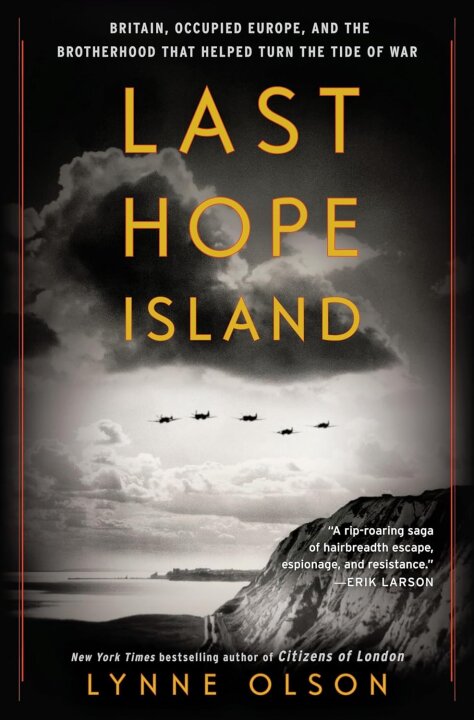Book to share - June 2024
Last Hope Island: Britain, Occupied Europe, and the Brotherhood That Helped Turn the Tide of War by Lynne Olson (2017)
Synopsis: When the Nazi blitzkrieg rolled over continental Europe in the early days of World War II, the city of London became a refuge for the governments and armed forces of six occupied nations who escaped there to continue the fight. So, too, did General Charles de Gaulle, the self-appointed representative of free France.
As the only European democracy still holding out against Hitler, Britain became known to occupied countries as “Last Hope Island.” Getting there, one young emigré declared, was “like getting to heaven.” We read about the courageous King Haakon of Norway, whose distinctive “H7” monogram became a symbol of his country’s resistance to Nazi rule, and his fiery Dutch counterpart, Queen Wilhelmina, whose antifascist radio broadcasts rallied the spirits of her defeated people. Here, too, is the Earl of Suffolk, a swashbuckling British aristocrat whose rescue of two nuclear physicists from France helped make the Manhattan Project possible.
Back in June of 1940, Hitler controlled the west coast of Europe from the Spanish border with France to the Arctic Circle in Norway. After crushing France, the remnants of Europe’s anti-Nazi forces congregated in Britain; monarchs of Norway and the Netherlands, governments in exile from Belgium, Czechoslovakia and Poland, young men from these conquered nations who escaped to Britain to carry on the fight, and of course, Charles de Gaulle, leader of the Free French. Together, along with British help, they resumed the fight against Hitler. Some became spies, some became pilots, while others became code breakers or resistance fighters. With British aid and leadership, they gradually built forces that strengthened the Allied cause, all leading up to the invasion of Normandy in June, 1944.
The British, so good at deception, code breaking and counter espionage, were at times clumsy amateurs at building and supporting resistance movements in occupied countries. Often this resulted in many good people being sacrificed to the Gestapo. The Poles, it turns out made major contributions to the Allied effort, providing the British with an Enigma machine, manning the most successful squadron in the RAF during the Battle of Britain, and providing thousands of troops who served bravely alongside British and American forces. And in the end, the Poles were sold out by the US and Britain to appease Stalin.
The rest is history that needs to retold these days more and more. Various nations, small countries, liberal democracies and parliamentary monarchies like Norway, Belgium or the Netherlands were thrown into the deep end of the most violent century ever, and from 1940 onwards a lasting sense of comradeship formed amongst these smallest of European countries from the Pyrenees to the Carpathians. France's General De Gaulle tried to change the course of their century for the better too, and for that Churchill's Britain of 1940 was also the real political lighthouse shining a bright beam of light across Europe for the rest of the 20th Century




